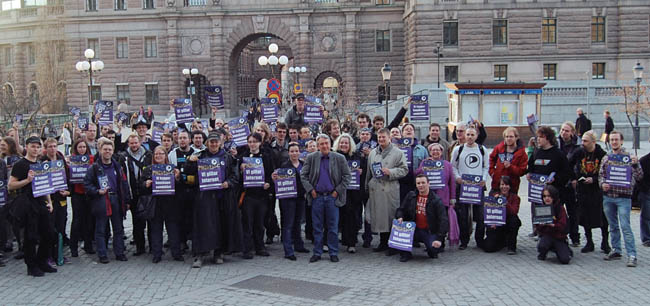
February 4, 2010
The Pirate Party
Can Sweden’s digital freedom fighters gain a foothold in Japan?
By Metropolis
Originally published on metropolis.co.jp on February 2010

Photo Courtesy of the Pirate Party
And then there are those who embrace the pirate label.
“The digitalization and globalization of the world forces many changes, but politicians and some parts of the business world try to keep society from changing instead of dealing with the change,” says Jan Lindgren, 30, campaign manager for the Pirate Party.
Also known as Piratpartiet, the Pirate Party was founded in Sweden in 2006 with the charter of making information politics a priority. It is now Sweden’s third largest political faction, receiving over 7 percent of Swedish votes cast in last year’s 2009 EU parliamentary elections. The Pirate Party has inspired grassroots movements in 33 other countries.
The crux of the party’s platform is taking a more sensible approach to digitalization. It’s never been easier for people to have their personal information collected, saved and stored without their knowledge. The Pirate Party urges that this information either be erased or its uses clearly identified.
The group also promotes more realistic policies on copyright. In an age when data is so easily transmitted, they say trying to force people to buy CDs and DVDs is foolish. Rather than simply criticize or prosecute downloaders, the party urges companies to work with policymakers to find ways to more effectively get products to consumers.

Photo Courtesy of the Pirate Party
In this sense, Japan offers a compelling model. Structurally, the country is a nightmare for new media. The number of new consumers is shrinking, and monopolistic publishing houses and broadcasters are fiercely resistant to digitization. This is one reason the Kindle has been so slow to enter Japan and TV shows rarely make it onto official websites.
Yet in another sense, Japan is remarkably forward-thinking. For 30 years, companies such as Kadokawa have experimented with a “media mix” model, in which popular series appear as novels, manga, anime, games, music, TV, films and merchandise. This helps explain the shift in anime to “charismatic characters” who can jump across media platforms.
In this model, the original media product serves more or less as a sales pitch for characters, which evolve in dialogue with a vibrant fan community. Japan’s largest privately operated public gathering is Comiket, a three day sales event for doujin (fan-generated) content that draws half a million people.
Indeed, seminal TV anime series Neon Genesis Evangelion was famous for releasing semi-official doujinshi featuring its insanely popular characters. The reciprocal arrangement works the other way around as well—one doujinshi by Nariko Enomoto was so good that Evangelion director Hideaki Anno included elements of it in the theatrical versions of the series.
Granted, this synergy and symbiosis only occurs in an environment where works are creative reinterpretations, not commercial rip-offs. Even the Pirate Party makes it clear that they’re not endorsing piracy. Rather, they want to see wider implementation of Lawrence Lessig’s concept of Creative Commons, by which works are made available for others to legally share and build on.
Japan seems to be on track, but Lindgren is hesitant to call the country enlightened.
“The laws in Japan are harsh against file sharing, and the creator of the program Winny was successfully prosecuted,” he cautions.
The Pirate Party is not active about expanding outside its native Sweden. Rather, it waits for people to build up movements in their own time in their respective countries. Lindgren says he’d like to see a Japanese branch of the party in the near future. Heads up, otaku: the pirate ship has arrived, and it’s time to hop aboard.
Find out how to start your own Pirate Party at www.pp-international.net or www.pp-international.net/forum/index.php.







